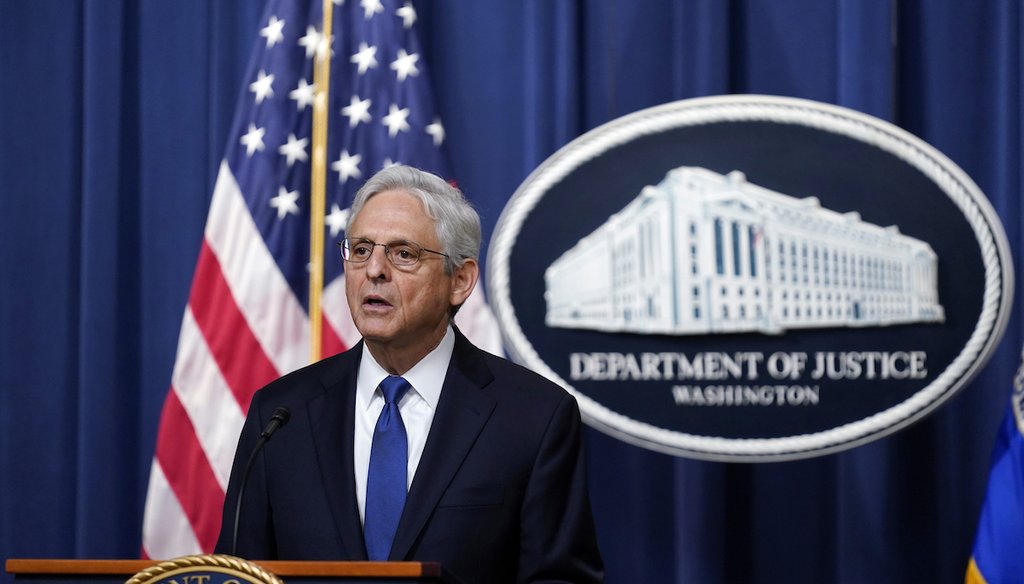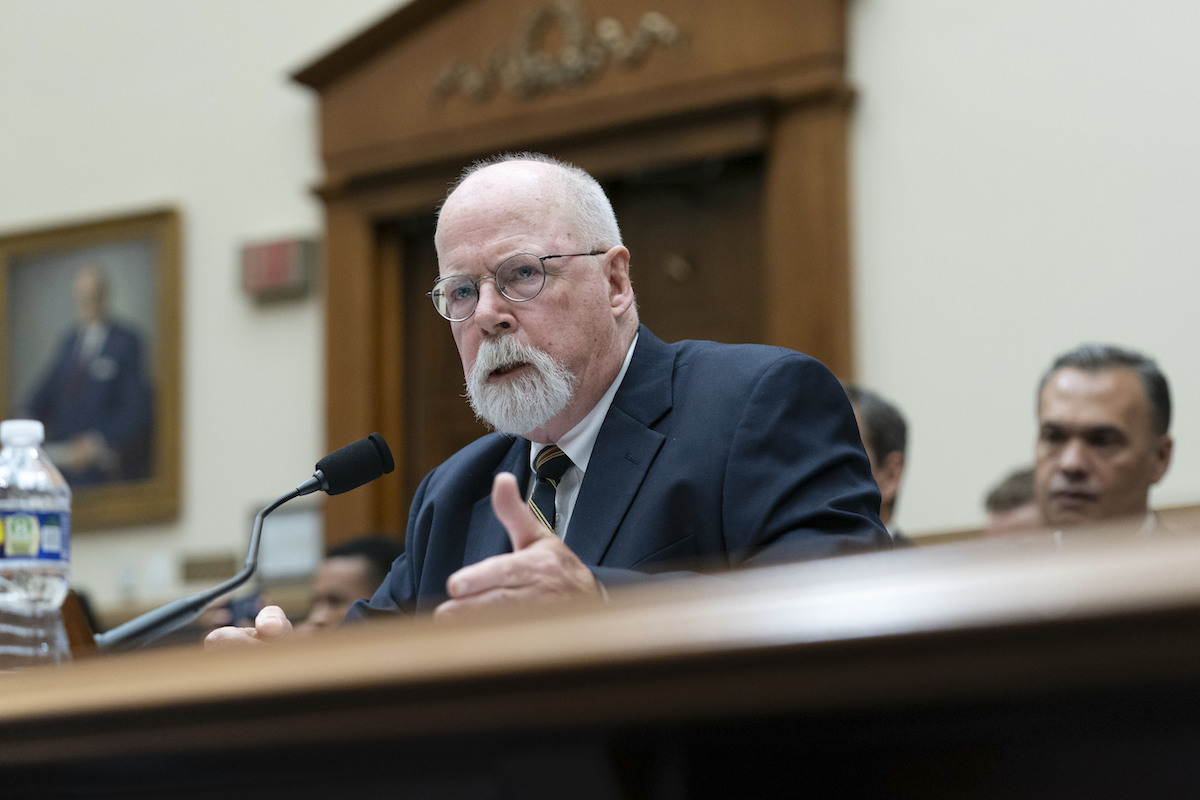Stand up for the facts!
Our only agenda is to publish the truth so you can be an informed participant in democracy.
We need your help.
I would like to contribute

Attorney General Merrick Garland announced the appointment of David Weiss as special counsel in the Hunter Biden investigation Aug. 11, 2023, in Washington. (AP)
If Your Time is short
-
The U.S. attorney general has broad authority under the U.S. Code — a compilation of laws passed by Congress. Merrick Garland cited that authority in his order announcing Delaware U.S. Attorney David Weiss as special counsel in the Hunter Biden investigation.
-
Separately, the Code of Federal Regulations contains Justice Department rules on the powers of a special counsel. Section 600.3 states that a special counsel appointee “shall be selected from outside the federal government.”
-
Like former Attorney General William Barr did in his appointment of John Durham, Garland’s order appointing Weiss cited his statutory authority as attorney general under U.S. Code, and noted that only special counsel regulations 600.4 through 600.10 applied in the case.
The same day a plea deal collapsed between Hunter Biden and federal prosecutors in Delaware, U.S. Attorney General Merrick Garland appointed a special counsel from that state to continue the investigation into President Joe Biden’s son.
David Weiss, a 2018 Trump administration U.S. attorney appointee, had requested special counsel status after overseeing the case that charged Hunter Biden with tax and weapons charges. As special counsel, Weiss will be relieved of day-to-day Justice Department supervision while he continues to direct the case.
Republicans seeking an independent review had long called for a special counsel to investigate Hunter Biden — more than 30 GOP senators wrote a September letter to Garland requesting Weiss. But some Republicans now say they oppose Weiss in that role. They argue Weiss offered Hunter Biden a "sweetheart deal" and say he doesn’t meet the requirements of the job because he still works for the Justice Department.
Charlie Kirk, founder of conservative advocacy group Turning Point USA, wrote on X, formerly Twitter, that Weiss’ appointment is "illegal."
"Section 600.3 of the Code of Federal Regulations states specifically that ‘(a) Special Counsel shall be selected from outside the United States Government,’" Kirk’s Aug. 16 post said. "That’s because the entire point of a special counsel is to be outside the influence and control of the DOJ apparatus."
We also saw the claim in an Aug. 12 Facebook post and it was echoed elsewhere by politicians, such as Rep. Beth Van Duyne, R-Texas, and pundits, such as Fox News legal analyst Greg Jarrett and Harvard University law professor Alan Dershowitz.
Section 600.3 of the Code of Federal Regulations states, "The Special Counsel shall be selected from outside the United States Government."
Sign up for PolitiFact texts
Although that suggests that a special counsel should not be a current prosecutor, this is not the first time a sitting prosecutor has been appointed as a special counsel. Since Justice Department regulations guiding those appointments took effect in 1999, three of the seven special counsels appointed in Democratic and Republican administrations were active prosecutors at the time of their appointment.
In 2003, Patrick Fitzgerald, then the sitting U.S. attorney for Illinois’ northern district, was appointed as special counsel by acting President George W. Bush administration Attorney General James Comey to investigate the leak of CIA agent Valerie Plame’s name.
In 2020, then-Trump administration Attorney General William Barr appointed John Durham as special counsel to continue investigating the origins of the Trump-Russia probe. Durham was the U.S. attorney in Connecticut at the time.
Rep. Jerry Nadler, D-N.Y., then the House Judiciary Committee chair, complained that Durham’s appointment was illegal because of the 600.3 regulation.
How is it possible to appoint a federal government employee as a special counsel when one Justice Department regulation states that he or she should come from outside the government?
We spoke with several experts who said that Garland, like Barr before him, invoked his statutory authority in his orders making the appointment.
"There is a simple, but unsatisfying answer to your question," said Josh Blackman, a constitutional law professor at the South Texas College of Law Houston who wrote about Durham’s 2020 appointment. "Garland did not appoint Weiss pursuant to the regulations. Rather, these regulations are referenced, but do not control the appointment."
Blackman is referring to the U.S. Code, which is a compilation of most federal laws currently in force, and the special counsel regulations found in the Code of Federal Regulations.
The U.S. Code differs from the Code of Federal Regulations — which compiles rules and regulations issued by executive branch agencies and federal government departments that have been published in the federal register.
Title 28 of the Code of Federal Regulations outlines the powers of a special counsel. Those powers were created by the Justice Department in 1999. Before that, an ethics law passed in 1978 following the Watergate scandal allowed an attorney general to request that a three-judge panel from the U.S. Court of Appeals appoint an independent counsel to investigate a matter.
Congress allowed the 1978 law to expire in 1999, meaning there was no longer a federal law governing such appointments.
When Garland appointed Weiss, he wrote in his order that it was by "virtue of the authority vested in the attorney general," including 509, 510, 515 and 533 of Title 28, chapter 31 in the U.S. Code. Those sections come from a part of the U.S. Code that governs the federal judicial system and lays out the attorney general’s broad authority.
Garland cited that same authority in his orders appointing Jack Smith, who is handling two cases involving former President Donald Trump, and Robert Hur, who is investigating President Joe Biden’s handling of classified documents. Both of those special counsels, however, came from outside the federal government.
Likewise, Barr cited his authority under U.S. Code sections 509, 510 and 515 in his order when he appointed Durham.
In appointing Weiss, Garland wrote that sections 600.4 to 600.10 of the special counsel regulations applied. Those regulations allow Weiss to file a public report and give him autonomy unless he acts outside of Justice Department policy. They also require the attorney general to formally explain to Congress any decision in which he or she overrules a special counsel’s recommendation.
David Sklansky, a former federal prosecutor and a Stanford University law professor, told PolitiFact the Justice Department often circumvents the 600.3 regulation — that the special counsel "shall be selected from outside the United States Government" — by invoking the attorney general’s broad, general authority.
"The Attorney General can give a U.S. Attorney the same powers that a special counsel would have if the special counsel were appointed from outside the government. That is what Attorney General Garland has done here. It is also what has been done in the past."
Barbara McQuade, a former U.S. attorney for Michigan’s eastern district in President Barack Obama’s administration, said because Weiss is a government employee, Garland used the U.S. Code instead of the special counsel regulations to appoint him. Otherwise, it "would have required a brand-new private attorney to start the investigation over, which would delay charging and create statute of limitations concerns," she said.
Special Counsel John Durham testifies before the House Judiciary Committee, June 21, 2023, on Capitol Hill in Washington. (AP)
McQuade said citing U.S. code is typical for attorneys general when appointing a sitting U.S. attorney as special counsel.
She said the structure of Garland’s order is "the best of all worlds from a good government perspective" because it allows for continuity in Weiss’ investigation and gives him all the power of a special counsel.
Sklansky said such an appointment "can have advantages, because a special counsel appointed from inside the government may be better equipped to conduct an expeditious and thorough investigation — especially if, as in this case, the special counsel is already familiar with the case."
Kirk spokesperson Andrew Kolvet, in an email to PolitiFact, reiterated the language in 600.3 of the Code of Federal Regulations, and said it "flatly contradicts Weiss’ continued service as a U.S. attorney for Delaware."
Kolvet said "other regulations in the same area drive home how the Special Counsel is clearly meant to not be a DOJ employee." He cited language in 600.7(b) that reads, "The Special Counsel shall not be subject to the day-to-day supervision of any official of the Department."
Some experts we spoke with saw no legal issues with Weiss’ appointment, while others said it hasn’t been ruled on by a court.
Rod Rosenstein is the former acting U.S. attorney general who in 2017 appointed former FBI Director Robert Mueller as special counsel in the investigation of alleged Russia’s interference in the 2016 presidential election. Rosenstein said that although appointing a government employee with other duties conflicts with the Justice Department’s regulation, Barr made a similar appointment and "no court has found it to be unlawful."
"Violations of governmental operating regulations are not necessarily illegal," he said.
Blackman said the attorney general’s "invocation of authority in this way has never been challenged by the courts."
Sklansky said regulations, such as the special counsel ones, "generally do carry the weight of law, but not always — it depends on if they are meant to be merely advisory." Although he doesn’t think the regulations in question are meant to be advisory, he said "they don't clearly prohibit Garland from doing what he did, which was to appoint Weiss using his ‘different’ authority than the authority set out in the special counsel provisions of the (Code of Federal Regulations)."
McQuade said that 600.10 of the special counsel regulations shows that none of the regulations are enforceable by law.
That regulation reads: "The regulations in this part are not intended to, do not, and may not be relied upon to create any rights, substantive or procedural, enforceable at law or equity, by any person or entity, in any matter, civil, criminal, or administrative."
Chuck Rosenberg, a former federal prosecutor and former acting administrator of the Justice Department’s Drug Enforcement Administration, said the attorney general’s authorities extend beyond the Code of Federal Regulations and allow him or her to appoint a current federal government employee to the post.
"The appointment was legal. Not a close call," Rosenberg said.
He pointed us to an essay he wrote in 2022 for Lawfare, in which he explained how, in 2003, Comey used his statutory authority to appoint Fitzgerald and give him more independence than the special counsel regulations permit.
Rosenberg in his essay cited a 2018 Congressional Research Service report, which stated that a special counsel "may be appointed under either the general statutory authority or under the specific special counsel regulations."
Kolvet, Kirk’s spokesperson, also said when Comey appointed Fitzgerald, he used "different federal regulations precisely because Fitzgerald was already a prosecutor at the time."
Comey cited his legal authority as acting attorney general when he appointed Fitzgerald, and they included some of the same U.S. Code sections Garland and Barr used in their appointment orders: 509, 510 and 515. Kolvet pointed to a follow-up letter (exhibit B) Comey sent to Fitzgerald clarifying that his appointment as special counsel "should not be misunderstood to suggest that your position and authorities are defined and limited by" the special counsel regulations.
That essentially made Fitzgerald an independent counsel, Rosenberg wrote in his 2022 essay.
Barr and Garland, however, chose under their legal authority to have codes 600.4 through 600.10 of the special counsel regulations apply to Durham and Weiss. That meant that although they would not be subject to day-to-day Justice Department supervision in those cases, they would have to operate within Justice Department rules and eventually report their findings to the attorney general.
Our Sources
Charlie Kirk, post on X, Aug. 16, 2023
Andrew Kolvet, spokesperson for Kirk, email interview, Aug. 17, 2023
National Archives, Code of federal regulations, accessed Aug. 16, 2023
Cornell Law School, 28 U.S. Code Chapter 31 - The attorney general, accessed Aug. 16, 2023
Rod Rosenstein, former acting attorney general, email interview, Aug. 18, 2023
Jack Goldsmith, Lawfare, Unpacking the Hunter Biden special counsel announcement, Aug. 11, 2023
Chuck Rosenberg, former prosecutor and acting administrator of the Justice Department’s Drug Enforcement Administration, email interview, Aug. 16, 2023
Chuck Rosenberg, Lawfare, A More Independent Special Counsel, Dec. 7, 2022
Josh Blackman, constitutional law professor at the South Texas College of Law Houston, email interview, Aug. 20, 2023
Josh Blackman, Lawfare, The Statutory Authority for Barr’s Appointment of Durham as Special Counsel, Dec. 2, 2020
David Sklansky, Stanford law professor, email interview, Aug. 15, 2023
Barbara Mcquade, University of Michigan law professor, email interview, Aug. 15, 2023
U.S. Justice Department, John Danforth appointment, Sept. 9, 1999
U.S. Justice Department, Patrick Fitzgerald appointment, Dec. 30, 2003
U.S. Department of Justice, Robert Mueller appointment, May 17, 2017
U.S. Department of Justice, John Durham appointment, Oct. 19, 2020
U.S. Department of Justice, Durham report, May 12, 2023
U.S. Department of Justice, U.S. Attorney Durham Announces Departure from Office," Feb. 26, 2021
U.S. Department of Justice, Jack Smith appointment, Nov. 18, 2022
U.S. Department of Justice, Robert Hur appointment, Jan. 12, 2023
U.S. Department of Justice, David Weiss appointment, Aug. 11, 2023
Office of the Attorney General, order appointing David Weiss, Aug. 11, 2023
United States Senate, Laws and Regulations, accessed Aug. 17, 2023
EveryCRSreport.com, Independent Counsel Law Expiration and the Appointment of "Special Counsels", Jan. 15, 2002
Congressional Research Service, Special Counsel Investigations: History, Authority, Appointment and Removal, March 13, 2019
Congressional Research Service, Special Counsels, Independent Counsels, and Special Prosecutors: Legal Authority and Limitations on Independent Executive Investigations, April 13, 2018
Congressional Research Service, Independent Counsels, Special Prosecutors, June 20, 2013
The Associated Press, The origins of special counsels, their powers and what to expect in the Hunter Biden probe, Aug. 11, 2023
The Associated Press, Barr appoints special counsel in Russia probe investigation, Dec. 1, 2020
The New York Times, Presidents and Their Prosecutors, Jan. 13, 2023
The New York Times, Barr Makes Durham a Special Counsel in a Bid to Entrench Scrutiny of the Russia Inquiry, Dec. 1, 2020
The Washington Post, Republicans who demanded special counsel to investigate Hunter Biden aren’t satisfied, Aug. 11, 2023
























